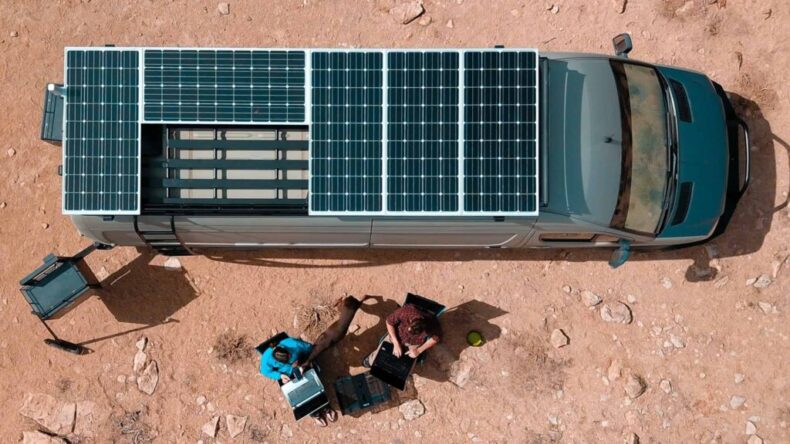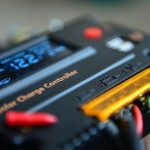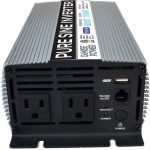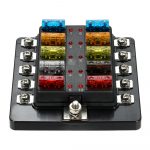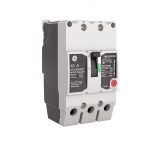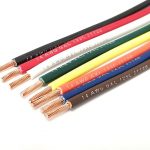Solar panels for campervans are becoming more popular than ever, as crowds of adventurers seek sustainable solutions to power their RVs and vans on long-distance road trips.
In light of the covid-19 pandemic, van life road trips allow you to get off the beaten (crowded) path and discover untouched natural wonders, reconnect with friends and relive the ‘Good ol’ days’.
The question is, what are the best solar panels to fit on your van or RV?
The aim of this article is to answer all your questions and shed some more light on the best solar panels for campervans!
Table of Contents
What Is A Campervan Solar Panel?
Seems, like a simple enough question right? I mean what makes a campervan solar panel different from your home setup?
Well, first and foremost, RVs and vans alike require much less energy to power the onboard appliances when compared to a household solar system.
The simple reason being you have much less equipment in a van than you do in a house. Additionally, even if you had these major appliances in your campervan, the surface area available to mount large solar panels is much less than the roof of your home.
Campervan solar panels come in 3 main forms: rigid, portable, and flexible.
- Rigid solar panels: These are generally fixed permanently onto the roof of your van. The solar cells are encased in various materials such as glass and are surrounded by a protective aluminum frame.
- Portable solar panels: These are usually made quite small and lightweight, enabling you to carry the panel with you on day hikes or backpacking trips. Usually, these panels include a built-in charge controller allowing you to charge various devices directly from the panel.
- Flexible solar panels: These are some of the newest forms of solar panel technology and are made from ultra-thin silicon wafers giving the panel complete flexibility in movement. They feel sort of like vinyl and are ideal for marine applications.
In summary: What is a campervan solar panel?
A durable monocrystalline, polycrystalline, or amorphous solar panel that can be mounted onto your campervan and power all your necessary appliances.
What Are The Best Solar Panels For Campervans?
If you plan to go on prolonged off-grid adventures you want to be able to rely on your solar panels.
The best solar panels are the ones that are able to power your appliances efficiently/effectively.
Below we have listed the best solar panel brands for campervans:
1. HQST 100 Watt Monocrystalline 12V Solar Panel
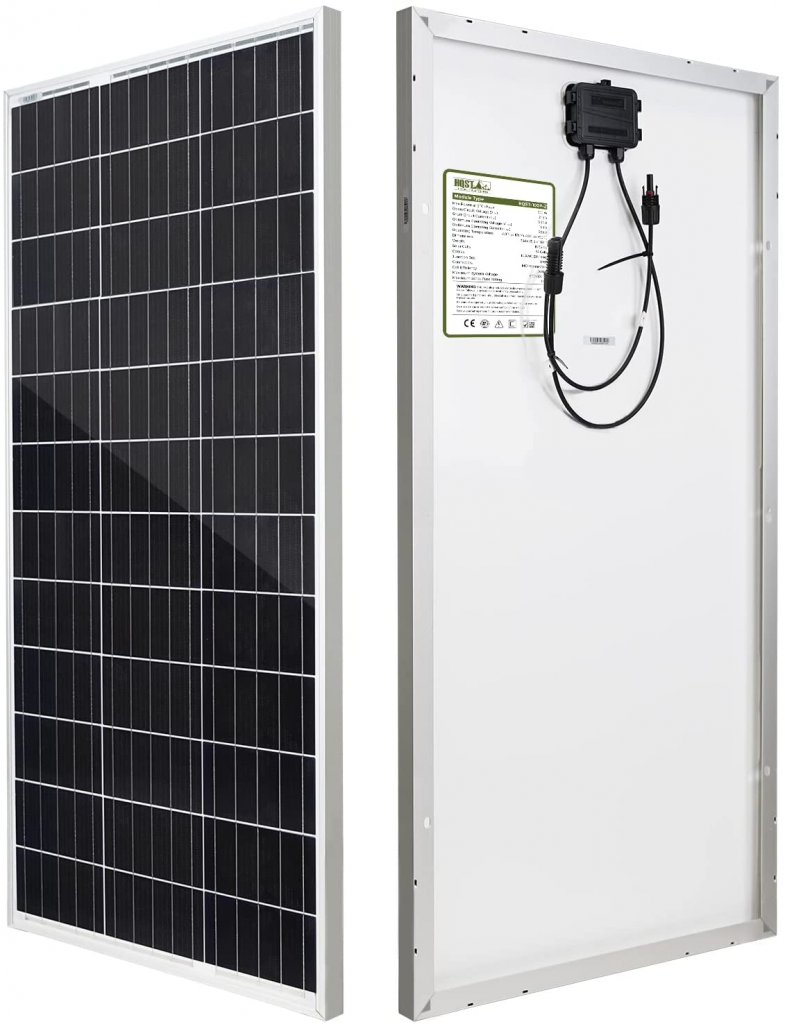
Main Features:
- Compact Design
- High-Efficiency Solar Panel
- Corrosion-resistant aluminum frame for better longevity
2. Renogy Flexible Monocrystalline Marine Solar Panel
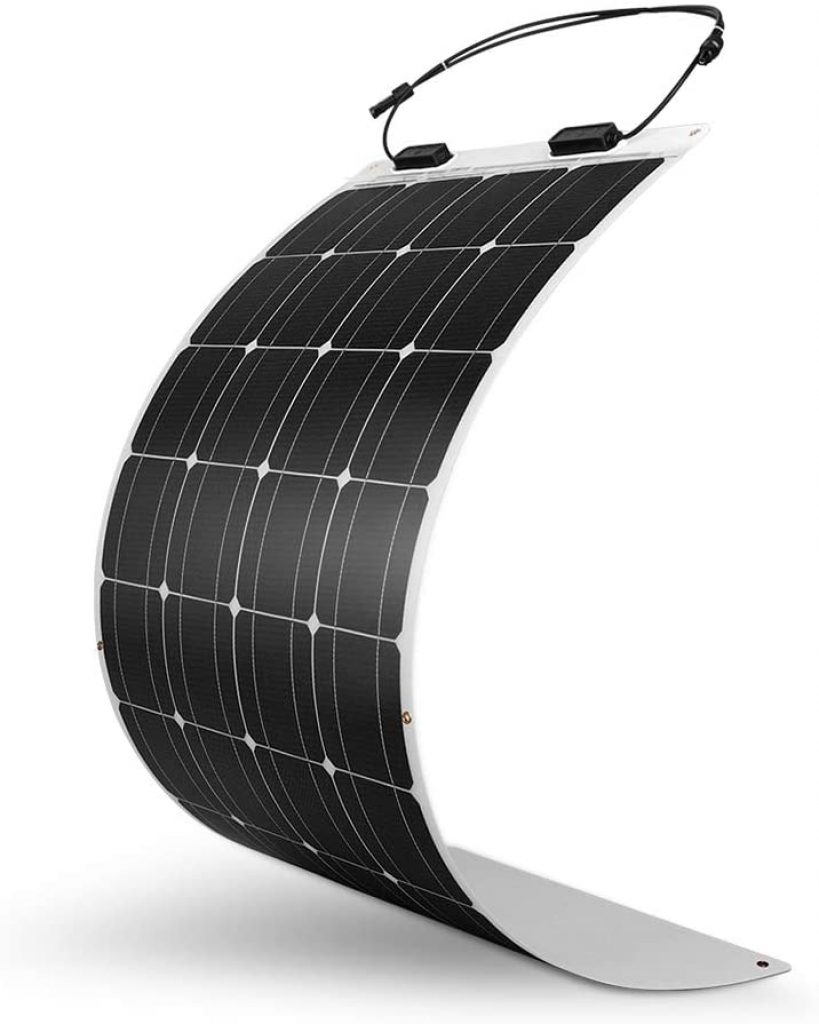
Main Features:
- Weighs 70% less than conventional panels
- 0.1 inch thick.
- Robust
- This solar panel can be flexed to a maximum of 248 degrees which makes it easier to transport and install.
3. Renogy Flexible Kit with 100W Monocrystalline Panel
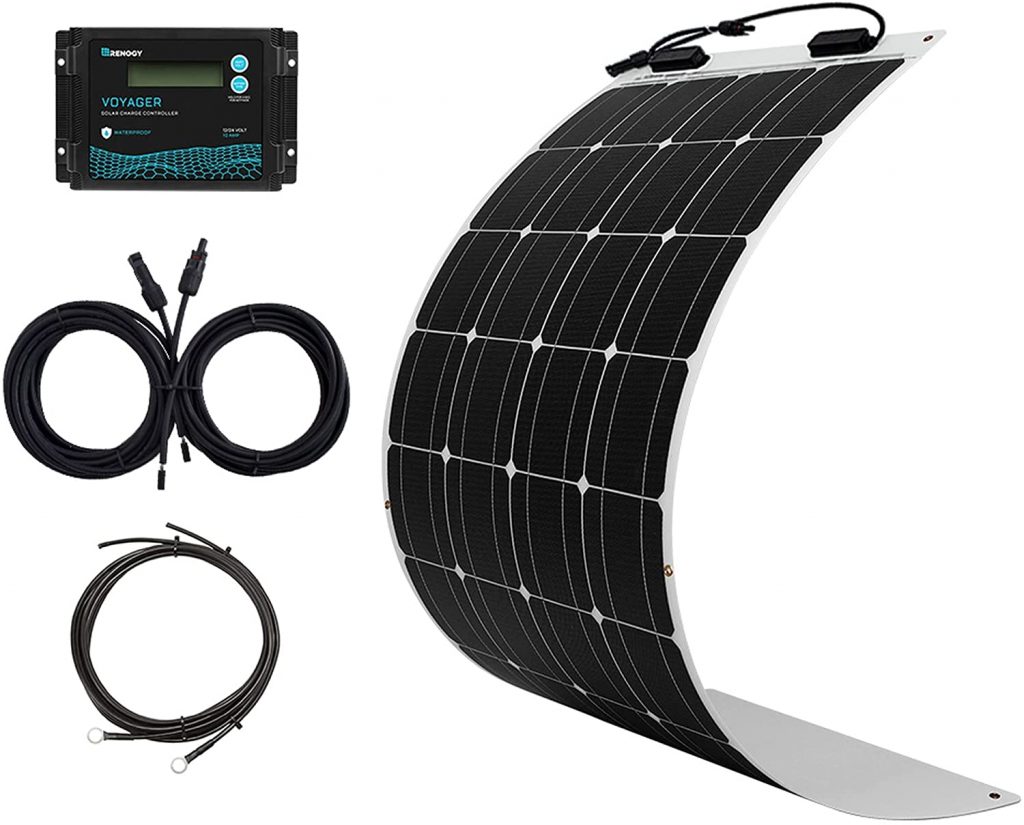
Main Features:
- Weighs 70% less than conventional panels
- 0.1 inch thick. 95% thinner than traditional marine solar panels
- Robust
- This solar panel can be flexed to a maximum of 248 degrees which makes it easier to transport and install
- With waterproof charge controller
4. Renogy 100 Watt 12 Volt Off Grid Solar Premium Kit
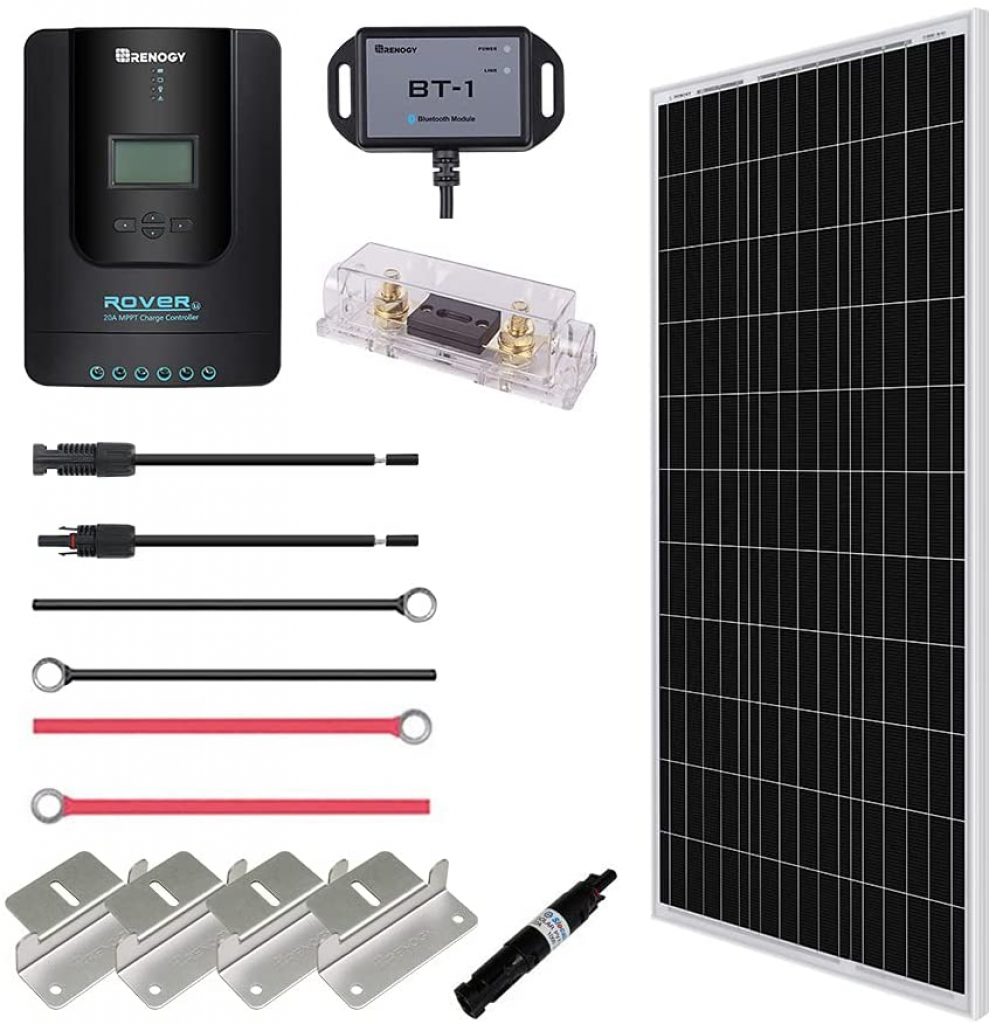
Main Features:
- Premium MPPT charge controller
- Comes with a fuse
- Rapid, efficient, and safe battery charging
- Waterproof panel and cables: IP67
- IP65 rated junction box
- High-efficiency solar cells
- El tested solar modules; no hot-spot heating Corrosion-Resistant aluminum frame
5. ECO-WORTHY 25 Watts 12V Waterproof Solar Panel
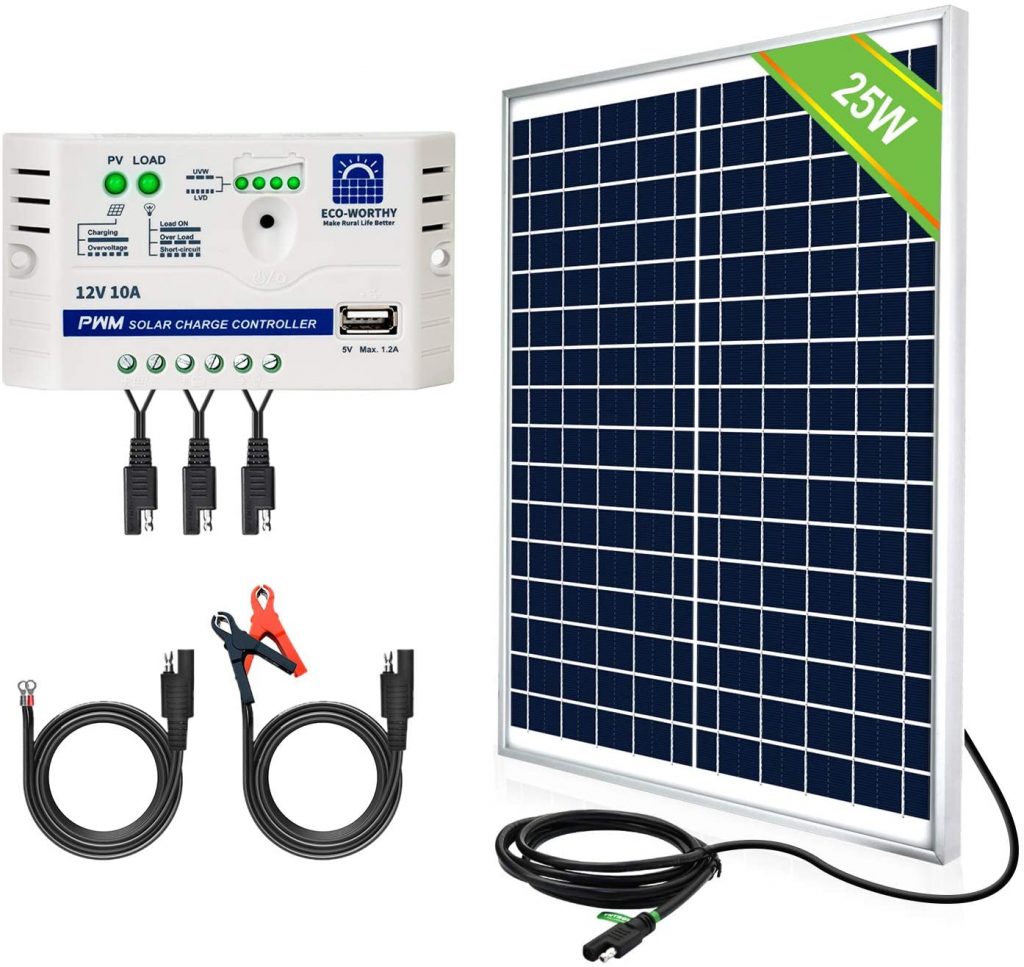
6. Newpowa 30W Watts 12V Mono Solar Panel
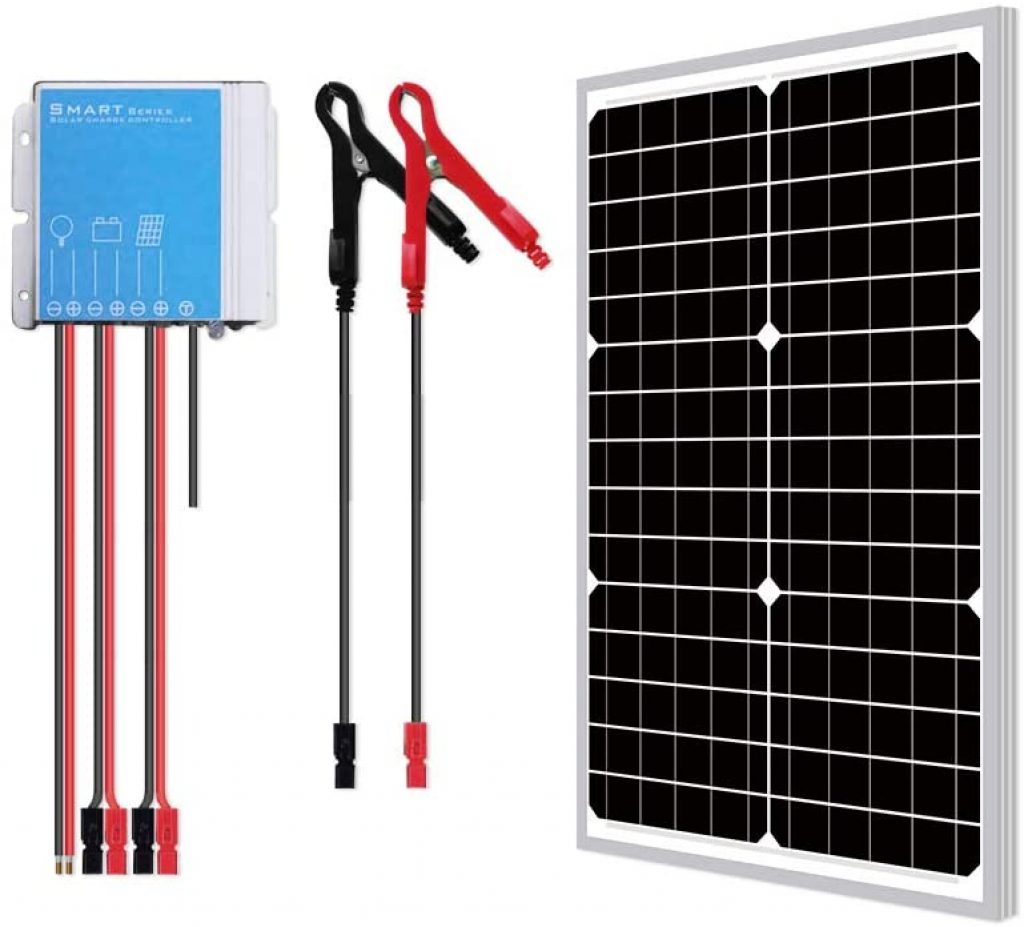
Main Features:
- Waterproof: IP67
- Plug and Play Anderson connectors
- Easy install thanks to pre-drilled mounting holes
7. Newpowa 100 Watts 12 Volts Monocrystalline Solar Panel
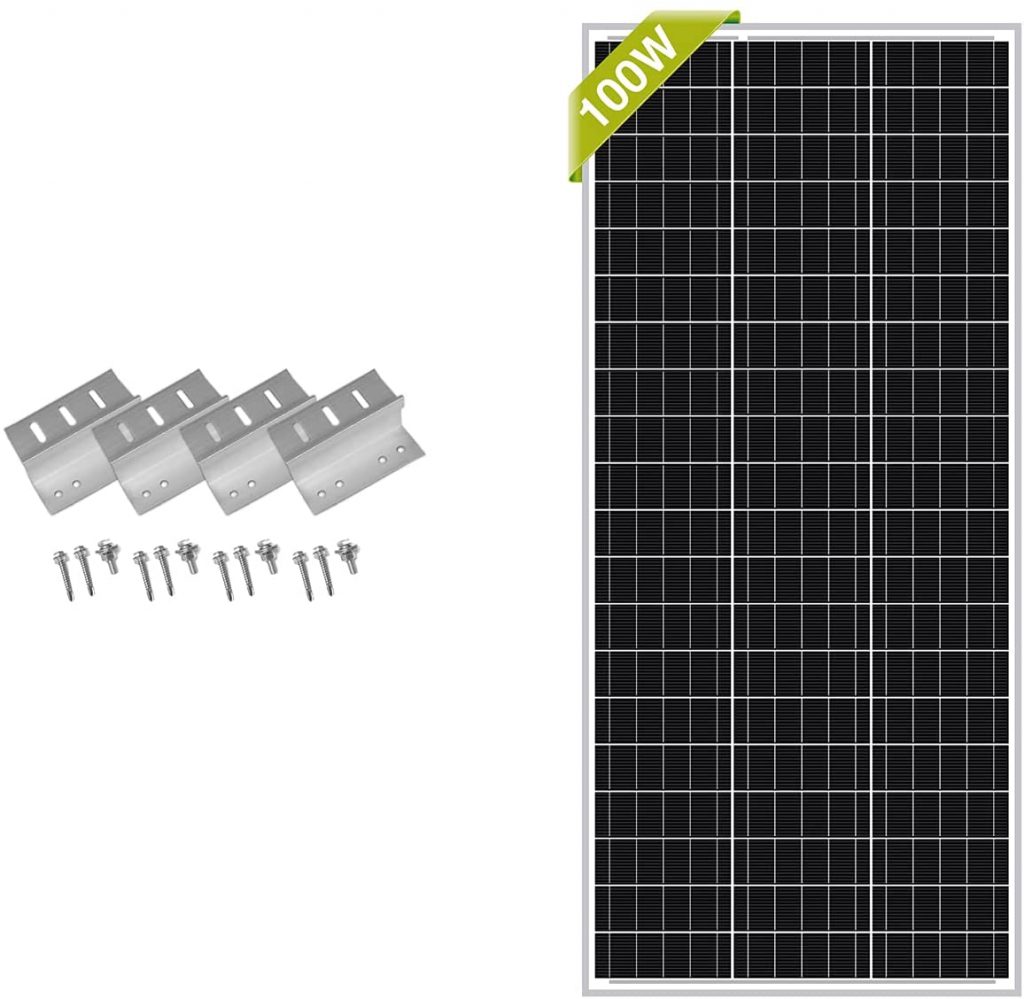
Main Features:
- Easy install thanks to pre-drilled mounting holes
- More compact new design
- Higher-efficiency solar cells
- Includes “Z” brackets and stainless steel hardware screws
8. ECO-WORTHY Complete Solar Panel Kit
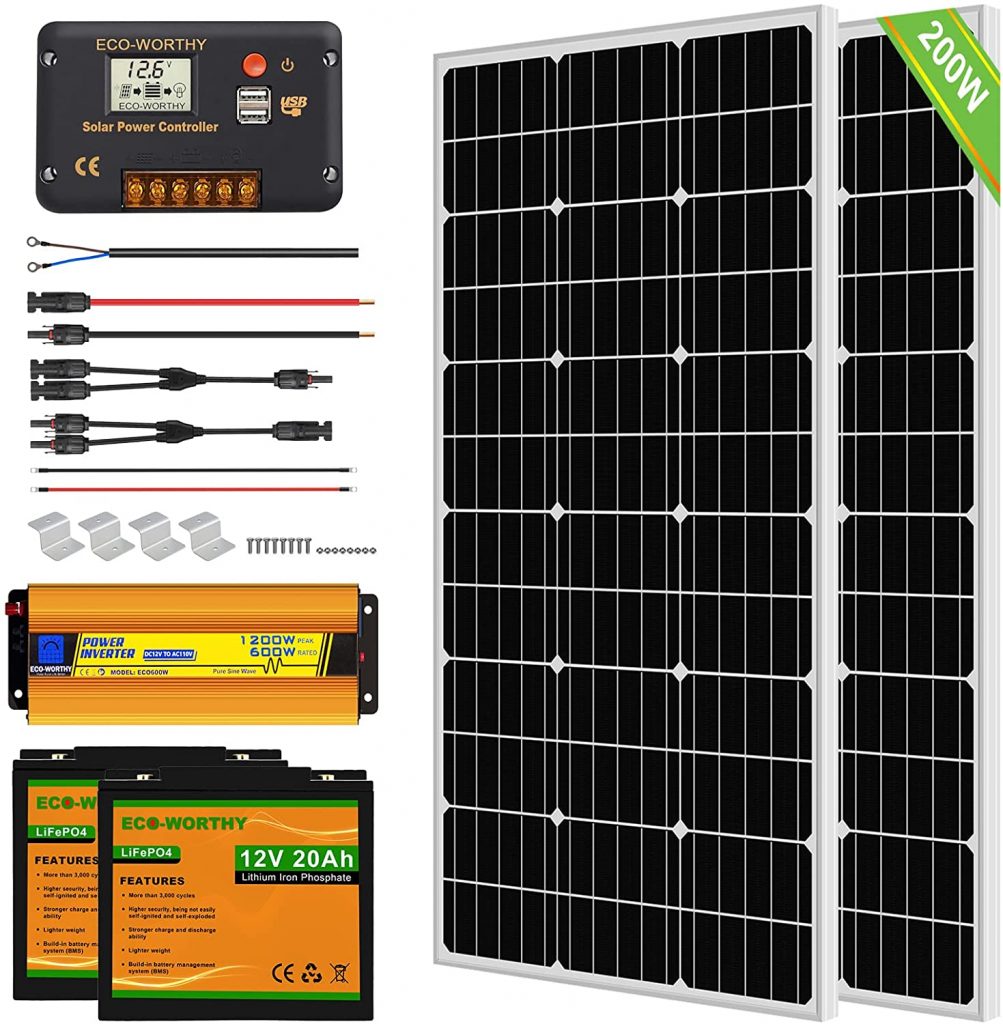
Main Features:
- 21% High solar cell efficiency
- Corrosion-resistant aluminum frame for outdoor use, allowing the panels to last for decades as well as withstand high winds and snow loads
- Complete solar panel kit
- Pure sine wave inverter with LCD display
- 1-year warranty
- 24/7 technical support team
What Size Solar Panel Do I Need For My Campervan?
The size of a solar panel generally correlates with the total watt output of your solar panel.
Knowing what size solar panel you need all depends on what appliances you need to power and how much space you have in or on your campervan to mount said panel.
Step 1 – Measure The Size Of Your Vans Roof
The first step will be to measure the roof of your campervan.
By doing this, you know exactly how much space you have available to dedicate to your solar panels and how much space you have to dedicate to storage such as spare tires, rims, and jerry cans.
Step 2 – Work Out Your Total Energy Usage
In order to determine what size solar panel you’ll need, you need to figure out what sort of energy you require.
To do this you’ll need to do a complete energy audit of your appliances.
Now, this does take some upfront work, to begin with. However, it will give you peace of mind knowing your exact energy requirements.
We have a dedicated article highlighting how to calculate how many solar panels you may need, based on your vehicle’s energy consumption. You can read that article here.
With that being said we do recommend making a table like the one below which outlines all the appliances you use in your RV or campervan, their wattage, and the number of hours each is used for.
| Appliance | Watt (W) | Hour usage per day (h) | Daily Consumption (Wh) |
|---|---|---|---|
| Small Fridge | 40 | 24 | 960 |
| Microwave | 800 | 0.5 | 400 |
| Plasma TV | 200 | 4 | 800 |
| Cellphones (x3) | 54 | 2 | 108 |
| LED Bulbs (x8) | 80 | 5 | 400 |
| Laptop (x3) | 300 | 4 | 1200 |
| Coffee Maker | 1000 | 0.15 | 150 |
| Water Purifier | 60 | 1 | 60 |
| Blender | 500 | 0.1 | 50 |
| Water Heater | 1440 | 0.5 | 720 |
| Total Daily Consumption (Wh) | 4,848 |
The amount of Wh used greatly depends on whether the campervan uses propane for cooking/heat or electricity. Our example uses propane, but you can update your table accordingly.
Step 3 – Decide On A Solar Panel For Your Van
Based on your energy requirements you can now decide on the best solar panel for your campervan.
Let’s assume your energy usage requires you to install 400 watts worth of solar.
You’ll want to decide on the most efficient solar panel in terms of maximum wattage + spatial requirements.
For example, perhaps one 400-watt solar panel takes up less space than 4 x 100-watt solar panels (which is usually the case).
How Do You Fit Solar Panels To A Campervan?
How Should My Solar Panel Wiring System Look For My Campervan?
Understanding how your van’s solar panel wiring should be set up does take some practical knowledge.
Understanding the terms is a start, so below I’ll touch base on the most popular items used in the majority of solar panel systems.
How Much Are Solar Panels For Campervans?
Solar panels for campervans vary greatly in cost.
However, certain characteristics affect solar panel pricing from the get-go, regardless of the actual brand.
- Monocrystalline – Solar panels made from monocrystalline solar cells are much more efficient than polycrystalline solar panels. This along with their manufacturing process make mono solar panels quite a bit more expensive.
- Flexibility – Again, the higher price tags here result from the manufacturing process being more labor-intensive.
- Watts – The total wattage of your solar panel has the biggest effect on the price tag. It goes without saying that the higher the wattage, the more material (silicon) is required, the result = a higher price tag.
Below we’ve created a spreadsheet that indicates the average costs of monocrystalline and polycrystalline solar panels.
| Panel Type | 50 Watt | 100 Watt | 200 Watt | 300 Watt |
|---|---|---|---|---|
| Polycrystalline | 35 USD | 60 USD | 110 USD | 150 USD |
| Monocrystalline | 75 USD | 125 USD | 300 USD | 330 USD |

